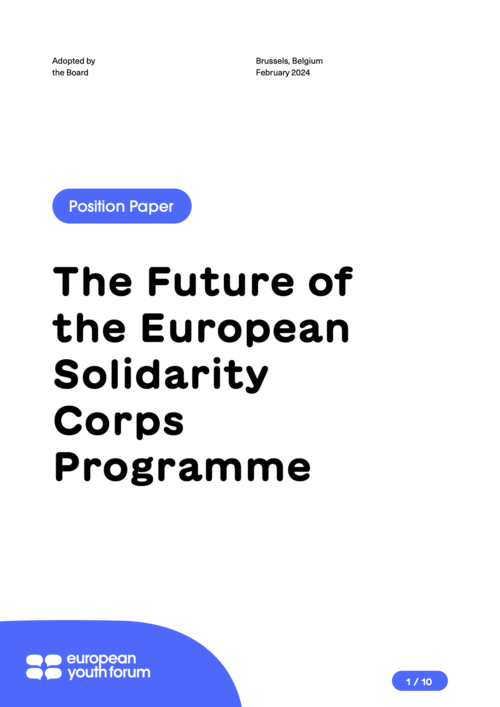The future of the European Solidarity Corps Programme
As one of the main EU youth programmes, the European Solidarity Corps has brought numerous benefits to young people and the youth sector in general all across Europe. It offers opportunities to young people in terms of personal and educational development precisely in the period of their lives in which they transition into becoming fully independent from their caretakers. This position paper identifies the areas for improvement for the programme as well as the elements that are working adequately and should be continued, particularly in the framework of its current evaluation.
Some of our key demands include:
- Triple the overall budget envelope for the European Solidarity Corps successor programme.
- Accommodate the annual budget envelope for the rising inflation and be indexed accordingly.
- Maintain the ESC as a standalone programme separate from Erasmus+ .
- Include youth work and youth organisations as an additional horizontal priority in the upcoming ESC successor programme .
- Lower the age limit to take part in solidarity activities to 16, both for in-country and international placements.
- Renew investments to ensure that the ESC programme reaches out to as many young people with fewer opportunities as possible as set in its goals, while improving data gathering and monitoring.
- Reassess the various IT tools to ensure their continuous glitches are fixed and their user-friendliness is improved.
- Increase communication, outreach and capacity building activities of both the European Commission and Erasmus+ National Agencies, targeted both towards potential participants and specifically for youth organisations to engage as sending or hosting organisations.
- Establish the “EU Volunteer Status” legally recognised across all countries participating in the ESC, to facilitate cross-border solidarity and the mobility of young volunteers.
- Reform and improve the governance and flow of information within the ESC programme by including the European Youth Forum as an observer in the ESC Programming Committee meetings, and National Youth Councils in advisory bodies of their respective Erasmus+ National Agencies.
Would you like to know more? Get in touch!

Related publications

The situation of youth organisations across Europe
Youth Organisations across Europe are facing an increasingly challenging situation. Political and economic circumstances are leading to shrinking civic spaces and therefore a shrinking chance of youth organisations to fulfil their purpose and represent the voice of young people. Read the motion to find out which of the European Youth Forum's members have been impacted and how, as well as what we commit to internally as part of our Strategic Plan and what we call for externally.

Protecting civil society and civic spaces in Georgia
In March 2023, the Government of Georgia initiated work on a legislative proposal on “foreign agents” that would have forced civil society organisations to be registered as being under foreign influence should they be receiving funding from sources outside of the country. As Georgia initiated negotiations for EU membership merely 6 months ago, this underscores how fragile Democracy and the Rule of Law are in our societies and how civic spaces must be protected tirelessly every day, everywhere.

Empowering Youth Voices: Defending Democracy and European Values
We cannot deny the European Union and its values are facing threats from both inside and outside. The European Youth Forum is committed to actively speaking out against these threats and protecting the values of intercultural understanding, democracy, respect, diversity, human rights, active citizenship, and solidarity.
